In the island city-state of Singapore, famed for its conservative stance, a transformation seems to be taking place. The changes are most palpable in the growing acceptance of the LGBTQ+ community and the softening attitudes towards gay issues. This progression is credited largely to the recent legal amendment that decriminalised consensual sex between men, offering drag performer Yeo Sam Jo, known as “JoJo Sam Clair” on stage, an environment of heightened confidence and safety.
As Yeo confidently moves through the city in a vibrant pink sequin dress, pearl necklace, and striking makeup, he encounters more curiosity than hostility. “Sometimes the stares range from ‘Wow, you look interesting’ to ‘Oh, you look different’, but nothing derogatory has been said or done,” Yeo remarked one balmy tropical evening before heading off to a show.
This shift in societal attitude comes seven months after the repeal of Section 377A, a colonial-era law that criminalised sex between men. The law, which did not encompass sex between women, could impose up to a two-year prison term on men found guilty of “gross indecency”. While the government in 2007 declared its intention not to enforce this law, it did censor gay films and prohibit gay festivals, citing that homosexuality should not be endorsed as a lifestyle.
The lifting of the ban, however, was not uniformly celebrated within the LGBT community. It came with a constitutional amendment by parliament aimed at thwarting court challenges that, in other countries, have led to the legalisation of same-sex marriage.
Nonetheless, Nanyang Technological University sociologist Laavanya Kathiravelu believes changes in legislation can catalyse shifts in societal attitudes. In a country like Singapore, where the “strong government often directs the moral limits of acceptability”, the repeal of 377A signals a top-down change in the social and political landscape. Kathiravelu posits that even those opposed to the repeal would need to respect and acknowledge these evolving identities.
The changes are beginning to permeate sectors that were once unimaginable. The usually conservative domestic media is featuring more discussions around LGBT issues, reflecting a more nuanced approach. The Islamic Religious Council of Singapore advised teachers to handle socio-religious topics, including LGBT issues, with “wisdom, kindness, compassion, and mercy”.
The annual Pink Dot rally for LGBT rights, despite governmental restrictions on foreign attendance and sponsorship, drew a large crowd. An administrative executive, Nishanthiy Balasamy, attending to support her gay brother, noticed more LGBTQ+ individuals openly expressing their identities.
The newfound tolerance has led to an increase in people coming out. High-profile activist Corinna Lim recently disclosed her sexual orientation at a policy conference attended by 950 people, including Law and Home Affairs Minister, K. Shanmugam. “The repeal of Section 377A has made it safer to talk about this,” Lim stated.
However, despite these strides, challenges remain. Public policies rooted in the conventional definition of a family, as a father, mother, and children, disadvantage LGBT families, particularly in areas like housing. While Pink Dot spokesperson Clement Tan acknowledges the shift in societal attitudes, he urges for further progression. “Our families are still being sent a message that they are not deserving of the same rights and protections as ‘ordinary’ Singaporeans,” Tan asserted, underscoring the need for continued advocacy.
READ MORE:
